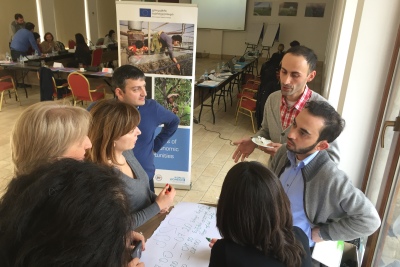Strengthening the gender mainstreaming capacities of the Ministry of Internally Displaced Persons from the Occupied Territories, Refugees and Accommodation (MRA)
Date:
Further to the adoption of its Gender Equality Strategy and Action Plan, the MRA honors its commitment to strengthen the gender mainstreaming capacities of its staff with support from UN Women and the EU.

Training participants in a discussion on women's and men's time use; Photo: UN Women
During the two days, the members of the Gender Equality Commission of the MRA, representatives from the regional branches of the Ministry and selected key staff gathered for training that focused on gender equality concepts and the international and national policy framework for the promotion of women’s rights. The training also covered gender-responsive budgeting as a tool to mainstream gender in budget planning, to ensure service delivery and resource allocation better reflect the needs of different groups of women and men. The training will strengthen the capacities of the Gender Equality Commission – composed of MRA department heads – in its role to implement and monitor the Gender Equality Strategy and Action Plan of the MRA.
Murad Ablotia, the head of the Internally Displaced Persons (IDPs) Department, noted that “The training was important to understand what actual and substantive gender equality means and what it takes to reach it, as we often find formal gender equality in legislation and policies but face a different reality in our work and our lives.”
Besarion Buchukuri, the head of the Finance Department, continued that “It was interesting to learn about gender-responsive budgeting and how gender analysis and gender equality principles can be taken into consideration in the budget planning process.”
The training was organized as part of the project “Equal Access of IDPs to Economic Opportunities”, implemented by UN Women and the Food and Agriculture Organization of the United Nations (FAO) and funded by the European Union. The project aims to support the sustainable livelihoods of the most vulnerable groups of IDPs and to enhance the capacities of the MRA to create gender-sensitive programmes and services. The project is part of the wider efforts of the European Union and its partner Ministry, the MRA, towards the socioeconomic integration of IDPs and conflicted-affected persons.